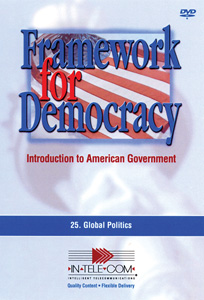GLOBAL POLITICS
DVD
In stock
Foreign affairs impact the lives of Americans on a daily basis; thus foreign policymaking is a central function of government. The U.S. moved beyond its isolationist tradition after World War II, adopting an active, internationalist approach to world affairs. The Cold War and the necessities of containment demanded an active approach to diplomacy, military preparedness and action, and intelligence gathering. The Vietnam War demonstrated the limits of containment policy and the ability of the U.S. to impose its goals. The relationship between the U.S. and the Soviet Union moved through a period of detente in the 1970s and then renewed competition in the 1980s before the collapse of the USSR.
Learning objectives:
- Explain the historical changes in U.S. foreign policy, from isolationism to active engagement during the Cold War, and now the possible emergence of multilateralism.
- Describe the foreign policy processes, procedures, and organizations.
- Understand the difficulties of setting a clear, coherent foreign policy since the end of the Cold War.
- Discuss the complexities of effective diplomacy, understanding the needs of various countries, and the trade-offs among national interests.
- Explain the growing role of economic issues in foreign policy, especially the debate surrounding free trade and protectionism.
- Understand Kenichi Ohmae’s argument regarding global economic changes and the implication for nation-states.
This title is part of the series: FRAMEWORK FOR DEMOCRACY
| Publisher | INTELECOM |
|---|---|
| Grade | 10 and up |
| Color | Color and black-and-white |
| Run Time | 26 minutes |

